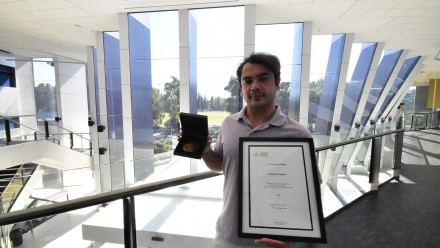Repeat Associated Non-AUG (RAN) Translation in Neurodegenerative Disease
Associate Professor Peter Todd, Department of Neurology, University of Michigan, Ann Arbor, Michigan, USA
Nucleotide repeat expansions are a common cause of inherited neurodegenerative disease, including ALS, Huntington’s Disease and Dementia. Recently it was discovered that disease associated repeats can be translated into proteins even in the absence of an AUG start codon. This process, known as RAN translation, generates toxic homopolymeric or dipeptide repeat proteins that drive neurodegeneration in model systems. Our group studies how RAN translation occurs mechanistically and how its products contribute to disease pathogenicity with a goal of developing novel therapies for patients with these repeat expansions.
Associate Professor Todd is a physician scientist whose translational research lab focuses on inherited neurodegenerative disorders. His lab studies how nucleotide repeat expansions cause or contribute to human diseases, including Amyotrophic Lateral Sclerosis (ALS), Frontotemporal Dementia (FTD), Fragile X-associated disorders (FXS and FXTAS), Myotonic Dystrophy, and Huntington’s Disease. We utilize models in drosophila, mice, cell culture, and human tissues to explore the mechanisms underlying these disorders with a long term goal of identifying novel therapeutic targets. Much of his current research focuses on how repeat expansions trigger a non-canonical translational initiation process known as repeat associated Non-AUG (RAN) translation and what consequences this process has on neuronal function and neurodegeneration. Additional studies are exploring other mechanisms by which disease associated RNA repeats are pathogenic.
In addition to his work as a scientist, he is a board certified neurologist with subspecialty training in movement disorders and neurogenetics and an expertise clinically in inherited neurodegenerative disorders. He regularly sees patients with Frontotemporal Dementia, ALS, and other neurodegenerative disorders at the University of Michigan and Ann Arbor VA neurology clinic. In addition, Associate Professor Todd directs the Neurogenetics Clinical Research Program at UM aimed at improving our approach to obtaining genetic diagnoses in patients with neurological disease and also co-directs the UM Fragile X and Ataxia clinics, both of which draw patients from across the country.












